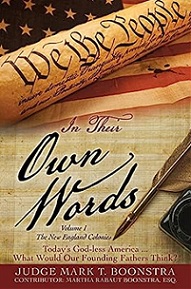
3 Vols.
Liberty Hill Press
Maitland, FL 32751
Paperback ISBN-13:978-1-6628-6246-5
Ebook ISBN-13: 978-1-6628-6248-9
The three volumes of this excellent research and analysis effort exhibit exceptional clarity in their exposition. This is thus an easy-to-read, deeply informative work.
In "In Their Own Words", Judge Mark Boonstra* shows readers what their gut instinctively is telling them. He reveals not only who our Founding Fathers were, and what they believed, but he brings them to light in their own words. And he then contrasts what our Founding Fathers said with real-world examples of what is happening today in America. So, don't take his word for it. Take the words of America's Founding Fathers themselves. And then ask yourself: What Would these Founding Fathers think of today's God-less America?
In the review published by Dustin Bass last May, he rightly points out that: «Boonstra diligently spent eight years working on his “In Their Own Words” multi-volume project, which presents the beliefs and ideas from all 118 signers of America’s three foundational documents: the Declaration of Independence, the Articles of Confederation, and the Constitution. His adherence to the letter of the law and his disdain for judicial activism has drawn the ire of the left. His appreciation for textualism, commonly referred to as constitutional originalism, has led him to place his needle within the social fabric of American society in hopes of sewing back some of its tears.»
Further down in his review, Bass remarks that «he believes that religion has been completely undermined in the United States, even to the point that it’s held in contempt by much of the general public, along with local, state, and federal governments. A notion that has driven this narrative is what he believes to be a misinterpretation of the establishment clause in the First Amendment, commonly referred to as the “separation of church and state” clause.
Boonstra noted that the establishment clause was absolutely necessary when the founders began forming the republic. Colonists had come to the New World to escape religious tyranny via an established church.»
Furthermore, «since the phrase “separation of church and state” isn’t in the Constitution but is rather a reference to the spirit of the law in a letter from Thomas Jefferson responding to ministers of the Danbury Baptist Association, it apparently has allowed for some people, from politicians to political commentators to professors to the average citizen, to misconstrue the spirit of that law.
“Today we say ‘separation of church and state’ and we make it appear antagonistic, but it wasn’t at all,” Boonstra said. “When Jefferson wrote that, it was because Baptists had been persecuted in certain colonies, including his colony of Virginia, and they wanted assurance that they would be able to practice as they wished.»
But this 3-volume work is NOT about religion, rather it offers us a vast panorama of the thought of the founding fathers of the North American homeland and how they laid the foundations of a nation that would become great and powerful thanks to that remarkable foresight.
It is without a doubt a remarkable gift of democratic thought.
* Judge Boonstra practiced private law for nearly three decades and he has sat on Michigan’s 3rd District Court of Appeals for the past decade up to the present day.
Comments powered by CComment